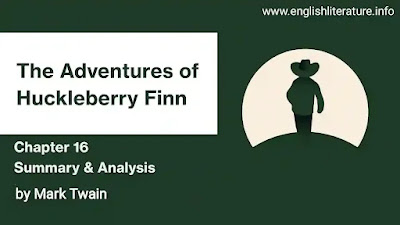Also Read
SUMMARY
Jim can't wait to get to Cairo. Every time they see 'light from a lantern, Jim jumps and says they are there. It was the most meaningful time of his life, as it would decide his definitive freedom from slavery or else, he would be in a slave country again and no more show for freedom". For the first time ever, Huck is in a quandary as he has to confront a guilty conscience for helping a slave escape. He tries to justify his actions because, after all, he was not the one to take Jim away from his "rightful owner". On the other hand, he chides himself for having behaved in the most despicable way with Miss Watson, who was good to him in "every way she knowed how".
Jim is hopeful of the day he would be able to reunite with his family. On the spur of the moment, Huck resolves to end his dilemma and hand over Jim. Two armed men in a skiff, who are looking for runaway slaves, summon him. Suddenly, in this struggle between head and heart, the heart triumphs. By cooking up a story, Huck makes them believe that the man in the raft is his father who is suffering from small pox. The men give him two twenty-dollar gold pieces and move on.
Soon they realize that they have overshot Cairo. Jim feels disgruntled with his fate because "Po' niggers can't have no luck". He attributes it to having seen the rattlesnake skin. More bad luck ensues when they discover that their canoe is gone. As if that wasn't enough, a big steamboat comes sailing in their direction. It is about to collide with their raft when Both Huck and Jim dive into the water to steer clear of it's way. Huck emerges from the water and looks for Jim who is nowhere to be seen. Suddenly, he is surrounded by many dogs and gets immobilized.
CRITICAL ANALYSIS
Huck's moral dilemma starts here. Even though he has physicaly escaped the society that he detests, he is not completely emancipated from its social conditioning. He has been reared to believe that slavery is "the right thing" and Jim, besides being a friend, is just a "nigger". Huck feels that it is appalling, on Jim's part, to even consider stealing his children because, according to Huck and the teachings of a society steeped in, racism, they "belonged to a man". Huck's contemplation, when says, "Give a nigger an inch and he'll take an ell" is bursting with his racial stance. But he is not to blame for this. How can one. renounce universally accepted ideas ideas that are "right" - in favor of those which, however humanitarian they may be, are always questioned? This conditioning makes Huck painfully aware of his 'wrongdoing'. His conscience pricks him thus "What had poor Miss Watson done to you that you could see her nigger go off right under your eyes and never say one single word? What did that poor old woman do to you that you could treat her so mean? Why, she tried to learn you your book, she tried to learn you your manners, she tried to be good to you every way she knowed how. THAT'S what she done".
The incident of the two slave hunters brings to light the code of religious demeanor, practiced by society. Instead of helping Huck's family, the two men buy him off to get rid of trouble. Let alone helping the sickman, they do not even want to go near the raft where he is. What, then, is the profundity of Widow Douglas' philosophy of being a philanthropist (Chapter 3), when Huck says, "I must help other people, and do everything I could for other people, and look out for them all the time, and never think about myself". Even more incongruous is the fact that, while they themselves are wary of small pox, they advise Huck not to be a fool again, and let people guess what is the matter. These two men are shallow enough to first worry about themselves and do not care an iota about other people, who have an equal chance of catching any possible infection.
Through these two slave-hunters, Twain derides the concept of Christian morality. He satirizes theories of "brotherhood" and "philanthropy" especially when such notions are only preached and not implemented. What is the use of claiming to be a "Christian" when one lacks a sense of basic humanity?
